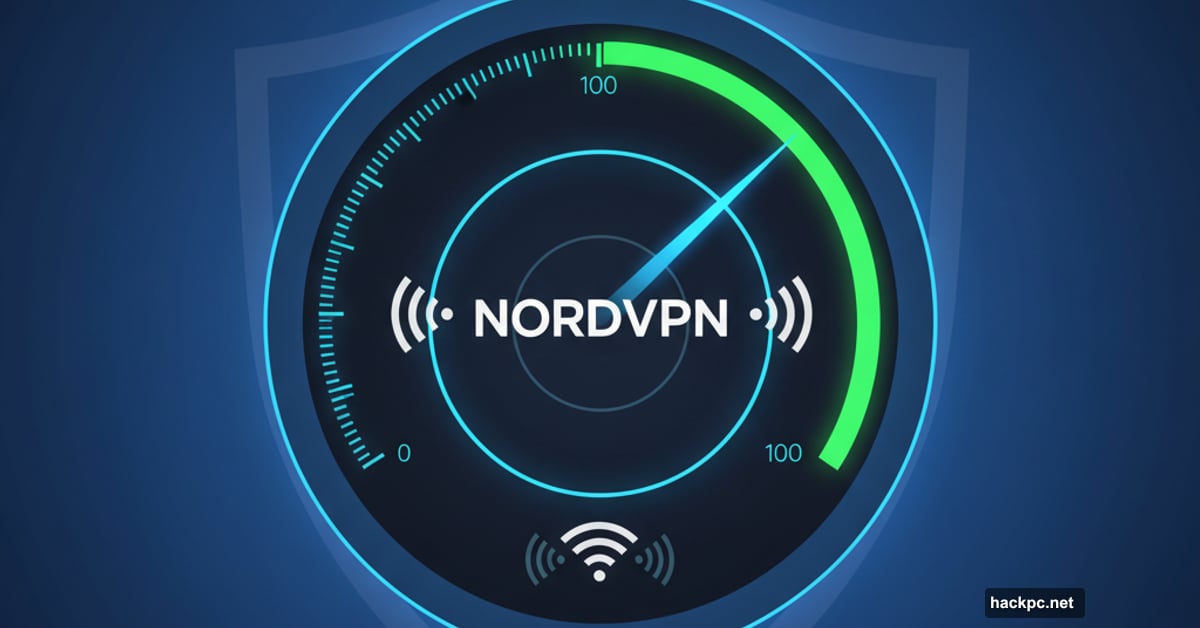
Your VPN shouldn’t slow you down. Yet most virtual private networks crater your internet speeds by 20-50%. Not NordVPN.
In 2025 testing, NordVPN delivered a jaw-dropping 3% average speed loss across 250+ tests. That’s not a typo. Plus, it sometimes made connections faster than baseline internet speeds. So whether you’re streaming 4K content, gaming online, or just browsing, Nord barely touches your performance.
But speed isn’t everything. NordVPN packs advanced privacy features like Tor integration and double-hop servers. Its massive global network unblocks streaming services effortlessly. And the apps work brilliantly on everything from Windows to Apple TV.
There’s one major catch though. Renewal prices spike 133% after your first year. That’s steep, even by VPN industry standards.
Speed Performance That Leaves Rivals Behind
Most VPNs claim they’re fast. NordVPN actually proves it.
During testing on Google Fiber Wi-Fi, NordVPN maintained near-baseline speeds. In fact, MacOS connections using both OpenVPN and WireGuard-based NordLynx protocols actually exceeded base internet speeds. Windows saw slightly more loss at 11% with NordLynx and 21% with OpenVPN. But even those numbers barely registered during actual use.
By comparison, Proton VPN clocked 16% average speed loss. That’s still respectable. But NordVPN’s 3% makes it the clear performance champion.
Why such minimal impact? Several factors contribute. VPNs can bypass ISP throttling by masking your IP address. Plus, Nord’s servers communicate efficiently, sometimes routing data faster than your ISP’s DNS servers handle requests.
Netflix recommends 15Mbps minimum for 4K streaming. Anyone with 50Mbps or higher internet won’t notice Nord’s presence. That’s exceptional performance for a privacy tool adding encryption layers.
8,000-Plus Servers Across 126 Countries
Nord aggressively expanded its server network over the past year. The current roster sits at 8,000-plus servers spanning 126 countries. That edges out ExpressVPN’s 105 countries and Surfshark’s 100.
Only Proton VPN offers more servers total at 14,900-plus. But Nord’s 126-country coverage slightly exceeds Proton’s 122 countries.
Why does this matter? More server locations mean better options for international travel. Plus, accessing geo-restricted content becomes trivially easy. Foreign Netflix libraries, region-locked Disney Plus content, sports blackouts—Nord handles them all smoothly.
Testing confirmed effortless access to Netflix UK, Canada, Australia, France, Germany, South Africa, Romania and Japan. Titles unavailable stateside like M3GAN on Canadian Netflix and Star Trek: The Next Generation on Romanian Netflix loaded instantly in crisp 4K.
However, Netflix Egypt wouldn’t cooperate, showing only US content. For that specific library, consider Proton VPN or ExpressVPN instead.
Pricing Starts Strong, Then Gets Ugly
NordVPN’s introductory pricing looks reasonable. The annual plan costs $60 for the first year. Two-year commitments drop to $83 total, or about $41 yearly.
That undercuts ExpressVPN significantly while matching Proton VPN. Surfshark remains cheaper at $48 annually. So Nord sits comfortably in the middle tier for initial pricing.
But renewal rates tell a different story. After your first year, that $60 annual plan jumps to $140. That’s a 133% price increase. Two-year plan renewals follow the same pattern.
Yes, Surfshark and Proton also raise prices. But Nord’s hikes are particularly aggressive. Surfshark goes from $48 to $79. Proton bumps from $60 to $80. Both increases feel more palatable than Nord’s doubling.
Mullvad takes the opposite approach entirely. It charges a flat 5 euro (about $6) monthly with zero price changes ever. That transparency stands in stark contrast to Nord’s renewal shock.
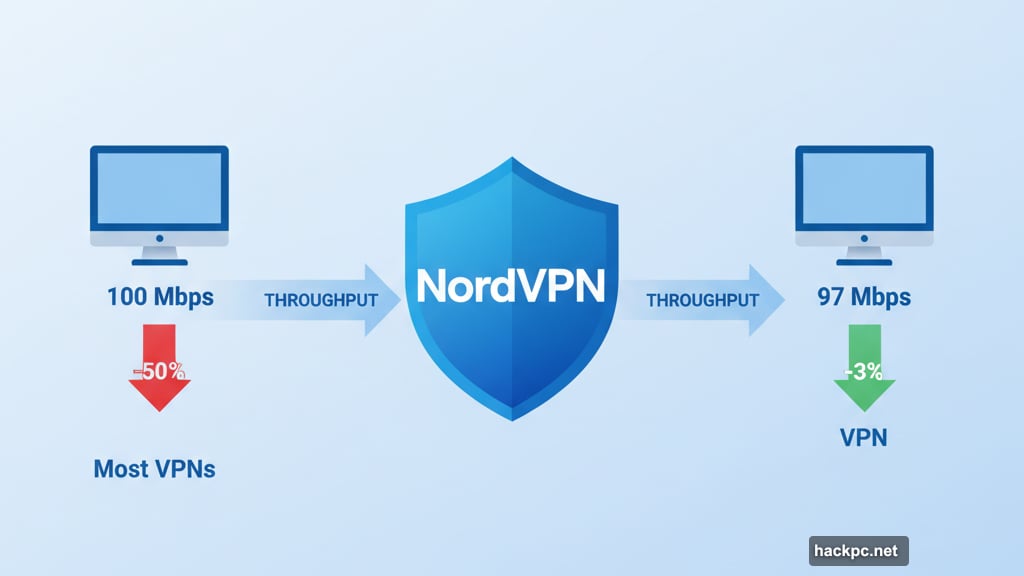
Class action lawsuits in California and North Carolina allege NordVPN’s autorenewal practices are deceptive. While the industry commonly hikes prices, Nord’s increases feel excessive.
Stack Subscriptions to Dodge Price Hikes
Here’s a clever workaround. NordVPN lets you stack subscriptions before your current plan expires.
Say you’ve got six months left on an annual subscription. During a Black Friday sale, purchase another year. That new subscription extends your existing plan 12 months rather than replacing it.
So buy your preferred plan length initially. Then immediately cancel autorenewal. Before expiration, grab another subscription during seasonal sales. You’ll maintain consistent pricing year after year.
It requires more babysitting than set-it-and-forget-it services. But the savings make it worthwhile if you’re committing long-term.
Three Plans Pack Different Value
Nord sells tiered subscriptions bundling various privacy tools.
The Basic plan includes only VPN service at $13 monthly, $60 annually or $83 for two years. That’s sufficient for most users wanting streaming access and basic privacy.
Plus adds NordPass password manager, Threat Protection Pro anti-malware, and breach scanning. It costs $14 monthly, $71 yearly or $108 for two years initially. Renewals jump to $180 annually.
Complete tacks on 1TB secure cloud storage for $15 monthly, $84 yearly or $135 for two years. Annual renewals spike to $219.
All tiers let you add optional extras. Dedicated IP addresses cost $9 monthly or $71 yearly. Incogni personal data removal runs $11 monthly or $81 annually. NordProtect Silver identity protection is $15.49 monthly or $90 yearly.
Bundling services offers convenience and potential savings. But putting all eggs in one basket means a single breach compromises everything. Consider keeping critical services separate.
Apps Work Brilliantly Across Every Platform
NordVPN supports virtually every device imaginable. Windows (x86 and ARM), MacOS, Linux (GUI and CLI), Android, iOS, iPadOS, Android TV, Amazon Fire TV, Apple TV, Kindle Fire, Oculus Quest, Apple Vision Pro, web browsers, and routers all have native apps.
Testing across Windows PC, MacBook Air, Android phone, iPad, Chromebook, Nvidia Shield TV, Android TV box, Fire TV Stick and Apple TV revealed consistent experiences. Apps maintain slick, modern layouts making server connections and settings adjustments intuitive.
It’s not quite as minimalist as ExpressVPN. But Nord welcomes first-time users while satisfying privacy enthusiasts.
Desktop apps feature visual maps with server locations. Streaming apps on Apple TV, Android TV and Fire TV devices use simpler country lists instead. Both approaches work smoothly.
Nord launched its first Linux GUI app in May 2025. That’s more accessible for Linux beginners than command-line interfaces. Power users still get CLI access for scripting and automation.
Streaming Services Unlock Effortlessly
Nord’s combination of minimal speed loss and extensive server network makes it exceptional for streaming.
Testing confirmed seamless access to Max, Peacock, Paramount Plus, Hulu and Crunchyroll when connected to US servers. Those services typically block VPN connections. Nord sailed right through.
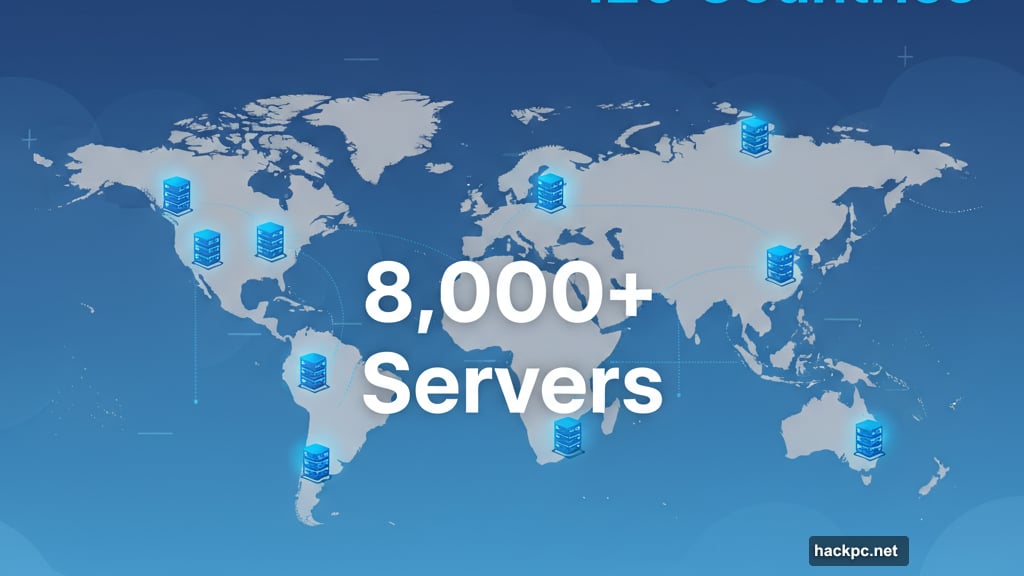
International Netflix libraries opened easily. Canadian servers loaded M3GAN. Romanian connections streamed Star Trek: The Next Generation. Both titles are unavailable on US Netflix.
Disney Plus and Amazon Prime Video international libraries also worked flawlessly. Whether cutting through sports blackouts or accessing foreign content, Nord performs reliably.
Buffer-free 4K streaming remained consistent across all services. That’s crucial since many people primarily use VPNs for entertainment rather than privacy.
Split Tunneling Works, But Android Needs Improvement
Split tunneling lets you selectively route apps through VPN connections. It’s useful when you want privacy for streaming but maximum speed for game downloads.
Nord includes split tunneling across platforms. During testing, Netflix streamed through a UK VPN connection while Steam downloaded Life is Strange at full speed by bypassing the VPN.
However, Android split tunneling only lets you exclude apps from VPN routing. Everything else defaults to VPN connections. By contrast, Surfshark and Proton offer more granular control. You can route only selected apps through VPN or choose apps to bypass.
There’s a helpful shortcut for excluding apps that don’t play nicely with VPNs. That made it quick to bypass VPN for the Sonos app, keeping it on the local network as required.
MacOS and iOS/iPadOS lack split tunneling entirely. Apple’s networking infrastructure complications starting in 2020 make this feature difficult to implement. Only Mullvad and PIA currently offer Mac split tunneling.
Customer Support Responds Quickly
NordVPN provides 24/7 support via email and live chat. No phone support exists.
Initial queries go to Nordbot, the company’s AI chatbot. Testing with renewal questions got clear, detailed answers including subscription stacking information. Nordbot’s transparency about being AI felt refreshing rather than deceptive.
Requesting a real person required simply typing “real person.” No hoops to jump through. Connection to human representative Pedro happened instantly.
Pedro proved friendly and informative, answering questions about mid-subscription plan upgrades thoroughly. The support experience felt genuinely helpful rather than scripted and rushed.
Privacy Features Cover Casual and Power Users
NordVPN operates from Panama, outside Five, Nine and 14 Eyes data-sharing alliances. That jurisdiction offers strong privacy protections.
Standard features include AES-256-bit encryption with OpenVPN and ChaCha20 with NordLynx. RAM-only servers wipe data during reboots rather than storing anything on hard disks. The strict no-logs policy means Nord doesn’t record browsing history, traffic data or IP addresses.
A kill switch cuts internet connections if VPN drops unexpectedly. Testing confirmed flawless operation across all platforms, keeping IP addresses hidden during disconnections.
Beyond basics, Nord offers specialty servers for enhanced privacy. Double VPN routes traffic through two servers instead of one. Onion over VPN combines Tor and VPN connections. Both make tracing traffic back to your device significantly harder than standard VPN connections.
Obfuscated servers attempt hiding VPN usage. That can help in restrictive networks like school Wi-Fi or certain countries. But obfuscation doesn’t guarantee undetected VPN use.
P2P-optimized servers improve torrenting performance. Nord lacks port forwarding, which could boost speeds for torrents with few seeders. But testing showed solid performance regardless. Plus, port forwarding creates security risks that many VPNs wisely avoid. Only Proton VPN among top-rated services offers it.
Post-Quantum Encryption Protects Future Privacy
Post-quantum encryption guards against potential decryption by quantum computers. It’s relatively rare in the VPN industry.
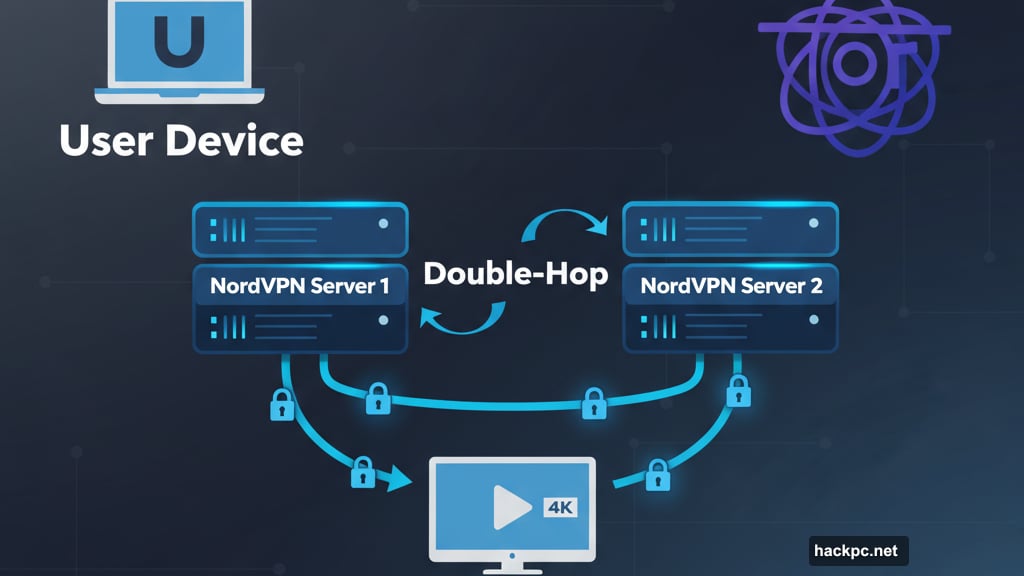
Nord deployed post-quantum protection across its entire app lineup. Windows, MacOS, Linux, Android, iOS/iPadOS, Android TV and Apple TV all support it. You can easily toggle it on and off.
The feature only works with NordLynx protocol, not OpenVPN or NordWhisper. Since NordLynx typically delivers faster speeds anyway, that limitation barely matters. Daily use involved either auto-connect or manually selecting NordLynx.
Android gets an additional perk: scam call protection. While many carriers offer spam filtering and phones include native blocking settings, having integrated protection is convenient.
Audits and Transparency Reports Build Trust
No-logs policies form the foundation of VPN trust. But proving them requires independent verification.
Deloitte conducted Nord’s fifth annual audit in 2024, finding no evidence of logging. That’s reassuring but not surprising for an established provider.
More interesting is Nord’s shift from warrant canaries to quarterly transparency reports starting in 2024. The reports are fairly basic, showing DMCA and government requests plus compliance rates.
Between April 1 and July 1, 2025, Nord received 3,001,848 DMCA requests and 88 government agency inquiries. The company disclosed limited user information exactly once as of August 2025.
That single disclosure happened in October 2024. Panamanian prosecutors issued a legally binding warrant during a criminal investigation. Nord complied with local laws while maintaining its no-logs promise.
The company could only provide payment details and account email confirmation. No browsing logs, traffic data or behavior information existed to share because Nord doesn’t collect it.
That incident actually validates Nord’s no-logs policy. When legally compelled to provide data, they genuinely had nothing to give. For stricter privacy, Mullvad doesn’t require email signup at all.
Privacy Policy Needs Minor Clarity Improvements
Nord overhauled its privacy policy in 2025 with reader-friendly improvements. Summary sections provide helpful overviews without requiring every word.
The Requests for Data section explicitly states: “We do not log users’ browsing history, traffic information, or IP addresses used to access the internet via our services.” That’s clear and reassuring.
One section could use more transparency though. The business transfer clause states Nord may share personal data during mergers, acquisitions or sales while ensuring confidentiality.
This isn’t uncommon. NordVPN and Surfshark merged in 2022. Kape Technologies bought ExpressVPN in 2021. But the policy could specify exactly what data might transfer during sales.
Nord called this “a standard clause used by the legal team to cover some theoretical possibilities in edge cases” via email. Fair enough. But more explicit language would better match the transparency Nord demonstrates elsewhere.
The Verdict: Speed and Privacy Win Despite Price Concerns
NordVPN delivers exceptional speed with minimal internet performance impact. Its extensive server network makes streaming and international travel easy. Privacy features span from essential basics to advanced options like Tor integration and double-hop servers.
Apps feel intuitive across every platform while remaining powerful enough for privacy enthusiasts. Post-quantum encryption future-proofs your security. Regular audits and transparency reports build trust.
The major downside is renewal pricing. That 133% price spike after year one feels excessive compared to competitors. But subscription stacking lets you maintain introductory rates with some extra effort.
For streaming fanatics, frequent travelers, or privacy-conscious users, NordVPN is an excellent choice. Just remember to manage your subscription actively or prepare for sticker shock when renewal time arrives.
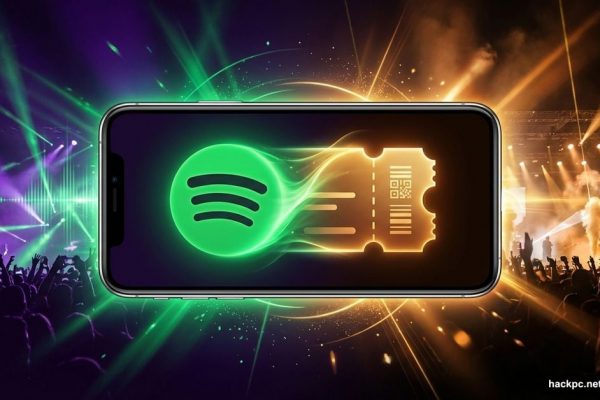
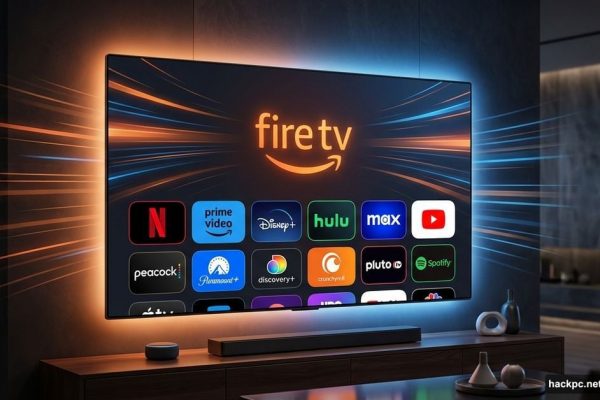
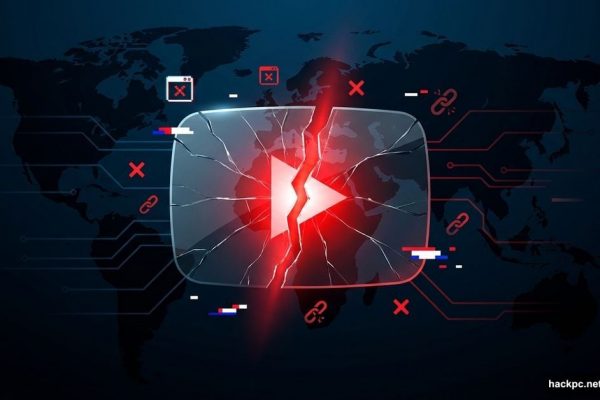
Comments (0)